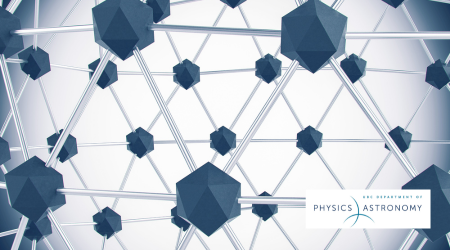Zigzag-edged Graphene holds promise for future

The PHAS Department congratulates PHAS faculty member Dr. Gordon W. Semenoff, on the publication of his article, "Boundary Ferromagnetism in Zigzag Edged Graphene", which was recently published in the Journal of Mathematical Physics (Issue 64, 2023 at https://doi.org/10.1063/5.0135165).
Graphene, a single layer of carbon atoms arranged in a two-dimensional honeycomb lattice, has been a subject of immense scientific interest since its discovery. Gordon is one of the pioneers of this subject, having shown how the relativistic structure of the electrons in graphene arise and discussed some of the interesting topological features of their spectrum in 1984 — twenty years before the 2004 discovery of the material in the laboratory.
In the recent Journal of Mathematical Physics paper Gordon completed a mathematical proof that a particular phenomenon, that was also first described some years before graphene was discovered, is likely to exist. The original work by a group at Tsukuba and Tokyo universities in Japan in 1996 used approximate techniques to argue that electrons bound to a certain type of edge of a graphene sheet necessarily had their spins aligned. In the intervening years, Professor Ian Affleck and collaborators at UBC refined this result and Gordon’s Journal of Mathematical Physics paper finally contains a complete proof that, for a large class of models of the interactions between the electrons in graphene, the electrons that are bound to the edge indeed align their spins.
Given the important potential applications of this edge magnetism in spintronics, where several novel classes of electronic devices have already been invented, any advance in their understanding is important.
Gordon is recognized for his work in Theoretical Physics, specifically for his research in nature at its most fundamental level: theoretical elementary particle physics spanning topics from String Theory, quantum field theory, quantum gravity, statistical mechanics, theoretical condensed matter physics, to work on the MOEDAL experiment at CERN.
He is also the recipient of numerous awards including Fellow of the Royal Society of Canada since 2000, the Sigma Si award (2021), EU Academy of Sciences (2021) and Officer of the Order of Canada (2012).
Congratulations, Gordon, on this fine achievement!
Links:
Learn More